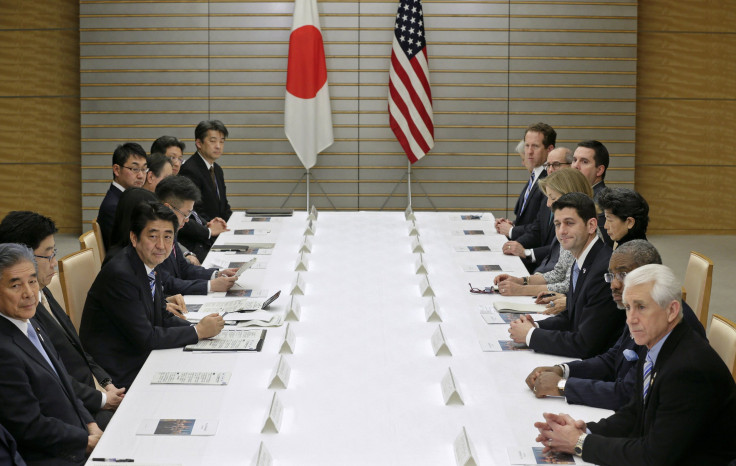Trans-Pacific Partnership: House Representatives Concerned About US Trade Deficit, Opportunities And Challenges In Asia

Members of the House Committee on Foreign Affairs convened for a subcommittee hearing Thursday on the opportunities and challenges that would accompany President Barack Obama’s Trans-Pacific Partnership trade agreement with Asian countries. Many representatives raised concerns about China competing with U.S. influence in the region, and whether anything can be done about an increasingly belligerent North Korea as the partnership pivots U.S. trading and political interests to Asia.
Negotiations on the TPP free trade pact began under the Bush administration in 2005, and have been continued by the Obama administration. Currently, 12 countries in the Asia-Pacific region are participating in the talks. The TPP has attracted much criticism from American lawmakers, especially over concerns of currency manipulation and effects on the trade balance.
A prime concern at the hearing was that the TPP would severely worsen the U.S. trade deficit as tariffs are taken down. Rep. Dana Rohrabacher, R-Calif., said the U.S. trade deficit with China currently stands around $350 billion before he asked the expert witnesses whether they believed that pushing ahead the TPP would benefit the U.S. “A trade agreement like TPP will increase our export opportunities,” responded witness Matthew Goodman, senior adviser for the Asian Economics Center for Strategic and International Studies. “There should be an expectation of greater trade and export to those countries. Imports are not as bad as people say,” he said. He added that by 2025, the U.S. would stand to gain some $76.6 billion from the TPP.
Other representatives wondered if the TPP would have an impact on affecting the human rights situation in Asia. Rep. Alan Lowenthal, D-Calif., said that part of the TPP is getting negotiating members of the agreement to abide by human rights standards set by the U.S. He asked the panel whether it is possible to get the members with a bad human rights track record to comply. “While it’s possible for us to push [countries like] Vietnam toward being more responsible toward its citizens, I don’t think you’re going to be able to turn to the Vietnamese administration and say ‘If you don’t make the following six changes, no TPP,’” Karl Jackson, director of the Asian Studies Program at the John Hopkins School of Advanced International Studies, replied. He then admitted that the United States has limited leverage to enforce such standards on the constituents.
“TPP is absolutely essential to the longstanding power and influence of the U.S. in Asia. If we don’t set the rules of the road, then China will,” said Abraham Denmark, senior vice president of the Political and Security Affairs and External Relations of the National Bureau Research, at the hearing. “We’ll see much lower standards for environmental protection. A lower quality of mode of economic integration,” he added.
On security, representatives asked the panel about North Korea and its disconcerting acquisition of chemical and nuclear weapons, as well as its increased capabilities in digital warfare, evidenced by North Korea’s alleged hack into Sony over the release of comedic film “The Interview” in December. Rep. Grace Meng, D-N.Y., asked if there was any way the TPP could disperse the situation. “The short answer is ‘no;’ not in the near term. It’s an increasing part of who they see themselves as being,” replied Van Jackson, visiting fellow at the Center for a New American Security. “They see it as a sort of operational capability. They don’t share the same taboo about chemical weapons that we have,” he said before adding that the responsible thing to do is to prepare for the range of possibilities with North Korea as it builds its military might.
Jackson felt that the hearing did not focus enough on security concerns, as it is not only North Korea that’s militarizing, but the whole of the Asia region, including China, Japan and many Southeast Asian countries. “The problem is that the United States doesn’t pay attention to such matters until there’s a crisis,” said Jackson in a phone interview. “There are tensions over unresolved land conflicts in the region,” he said, pointing to the Takeshima/Dodko island disputes and China’s man-made island in the South China Sea. “On top of that, countries are increasingly having the capability to take action,” Jackson said.
However, Jackson said that while it was good to see the representatives rallying over North Korea’s militarization, Congress really needed to dissuade Asia away from the idea that “might is right.” “The TPP reflects Western values and those values are not organic to Asia,” he said, describing Obama’s efforts to “rebalance” Asia as a strategy of introducing liberalism and stability into the region. There’s no question that China is at the forefront of the arms race, and if China’s influence is left unchecked, it could scuttle the TPP, according to Jackson.
China has put forth its own version of the TPP, known as the Regional Comprehensive Economic Partnership, and has been dissuading TPP members toward its own free trade agreement. “As Asia grows more wealthy, we need to be a part of that; otherwise it becomes an autonomous region,” Jackson said. “Without the TPP, it’s harder for use to sustain the U.S. presence in Asia,” he said.
© Copyright IBTimes 2024. All rights reserved.





















